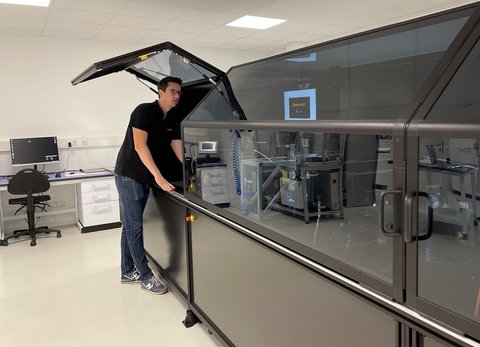 Research project led by Continental project manager Tim Wolfer combines rubber, plastics and electronics at the printing technology centre in Freiburg
Research project led by Continental project manager Tim Wolfer combines rubber, plastics and electronics at the printing technology centre in Freiburg
Result should be an example for many other applications and enable new business models and services
Freiburg is a suitable location with a large network
Test, try, rethink. Short paths, lean processes, fast results - a small team of highly qualified experts is taking an important step towards the digital future at Continental's new location in Freiburg. "It feels like being in a start-up. We are very flexible and can quickly develop and adapt our processes, there is a great dynamic here. At the same time, we can build on the strength of the entire Continental Corporation," says Tim Wolfer, who coordinates research projects for functional printing processes at the Freiburg site as project manager. Here, for example, classic rubber and plastic products, which until now have only fulfilled mechanical tasks, are to be enriched with sensor technology, intelligent systems and actuators and thus digitised. Wolfer holds a doctorate in mechanical engineering and has been responsible for research projects in the printing technology centre since autumn 2020. "My focus here is on the integration of intelligent systems and networks. In particular, we are looking at the interface of components made of elastomers and the integration of electronics," says the engineer. Born in Bremen, he previously worked for five years as a group leader at the Production Technology Centre of the University of Hanover. There he established close contacts with his current employer Continental, among others. The 36-year-old family father was already passionate about tinkering and screwing in his childhood and youth - and for this reason studied mechanical engineering. He came into contact with functional printing during his doctorate on the additive manufacturing of optical systems. "Now I am happy to be able to apply this knowledge in the research and development of a technology group," adds Wolfer.
One of Wolfer's pioneering projects is the "sensIC" project: Integrated sensor technology is used on the basis of printed electronics in hose lines for electric vehicles. Specifically, hoses for the thermal management of vehicle batteries are equipped with integrated temperature sensors. Continental is bundling such research projects in the printing technology centre in Freiburg; sensIC will run for three years. The Federal Ministry of Education and Research is supporting the project proportionally with 2.9 million euros.
Project will be the key to sensor technology and electronics in rubber products
Continental expects a lot from sensIC - above all, a wide range of applications for the technology and lower costs in production. "Printed electronics we can theoretically use everywhere. The product range is virtually infinite and perfectly tailored to Continental's strategy: making products intelligent and developing new business models and mobility services from them," says Wolfer. "Hoses are just one example. But if it works there, then also in air springs, belts, conveyor belts and tyres, for example." And that is precisely one of his exciting main tasks: transferring the technology to other areas of Continental.
Industrial scale as the goal
"In this respect, the project has lighthouse character for us," Wolfer emphasises. "We are using highly productive printing processes in this project to manufacture the electrical networks. These processes promise a very large throughput of processed area at very low cost." In addition, the electronics must be absolutely safe, because they are increasingly being installed in automobiles and equipment. Therefore, a special focus in the project is on securing the electronic systems against manipulation and plagiarism.
"The biggest challenge is not only to investigate the novel technical systems on a laboratory scale, but later to actually manufacture them on an industrial scale at our colleagues in Hamburg," says Wolfer. Because: "The systems in themselves already have an enormous complexity on a small scale due to the fine and sensitive structures. For example, a specific silicon chip is designed and produced for us as part of the project. But in the subsequent production in Hamburg, we are then suddenly confronted with challenges such as thermal expansion, solvents, high pressures and high temperatures." Right at the beginning of the project, Wolfer and Co. therefore had to assess what technical requirements awaited them in the end in order to make a sensible choice in materials and concepts right from the start. "It was quite a challenge to reconcile all the technical goals. But now the technical concept is in place and the project has taken off," Wolfer emphasises.
Freiburg as the perfect location
And why Freiburg? "Quite simply: in order to create a central location for this technology, Continental has bundled its activities in functional printing in a technical centre here. In addition, the Freiburg location was particularly suitable because of the close cooperation that already existed with a local technical and scientific network, such as the Fraunhofer ISE, the Karlsruhe Institute of Technology (KIT) or the 'microTEC Südwest' technology cluster."
A start-up atmosphere, a strong local network, a new printing technology centre and a powerful international technology company - the conditions for the success of the sensIC project could hardly be better for Tim Wolfer and the project team.


















































































